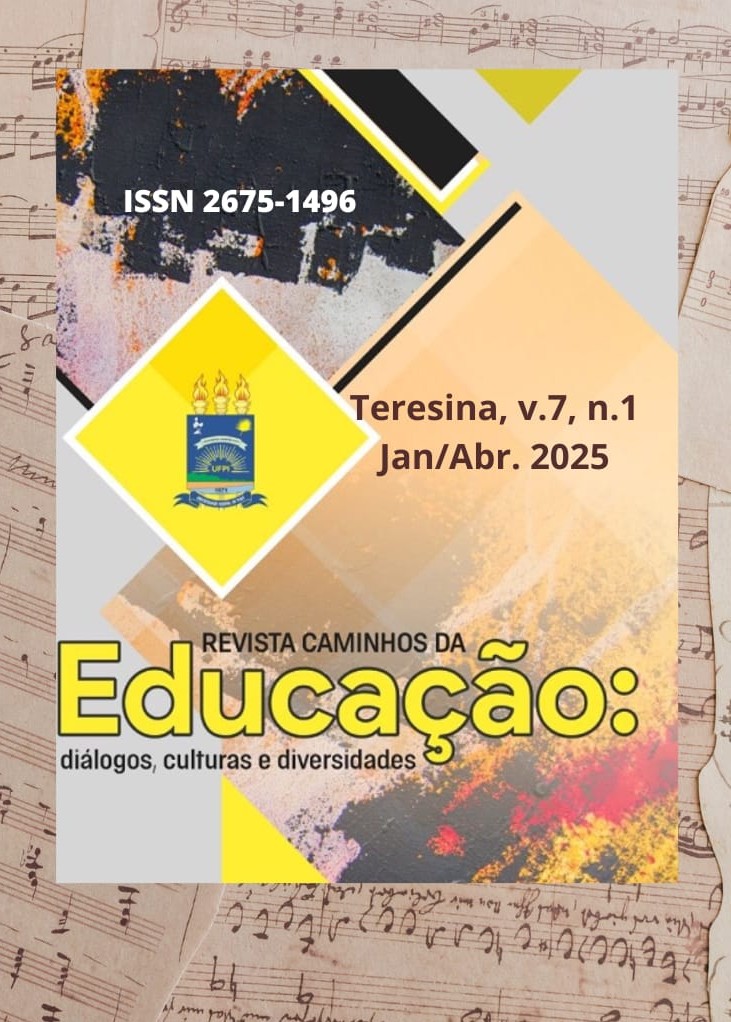O LETRAMENTO LITERÁRIO A PARTIR DE FERRAMENTAS E RECURSOS DIGITAIS NOS ANOS FINAIS DO ENSINO FUNDAMENTAL: UMA REVISÃO SISTEMÁTICA DA LITERATURA
DOI:
https://doi.org/10.26694/caedu.v7i1.6398Keywords:
Elementary Education;, Digital Tools and Resources;, Literary Literacy.Abstract
Literary literacy, understood as the ability to interpret and critically engage with literary texts, is an essential component of students’ educational development. In the contemporary context, characterized by the ubiquity of digital technologies, a crucial question arises: how can digital resources and tools be effectively integrated into the teaching of literary literacy? Building on this premise, this study presents a systematic literature review (SLR) to investigate the existence of scientific studies over the past five years that address literary literacy in the final years of elementary education, with an emphasis on integrating digital resources. The objective is to analyze how digital technologies can enhance literature teaching by fostering reading and cultural skills. The SLR examines concepts of literary literacy, the use of digital tools, and their contributions to learning. The analyzed studies reveal that literary literacy defined as the ability to interpret, appreciate, and critically reflect on literary texts is significantly enhanced by the use of digital technologies. These approaches make teaching more interactive and engaging, encouraging students’ creativity and involvement. Despite these advances, the authors emphasize the need for careful pedagogical mediation to maximize the educational impact of digital technologies. It is concluded that integrating digital resources into literature teaching is not merely a complementary strategy but a transformative pedagogical approach. When well-planned, this practice fosters critical reading skills and expands the relevance and accessibility of literature education in the 21st century.
Keywords: Elementary Education; Digital Tools and Resources; Literary Literacy.
Downloads
References
ARGUEJOS, Alessandra Oliveira. Literatura "em série" [recurso eletrônico]: uma proposta de letramento literário e estudo do gênero narrativo a partir das séries de TV e das fanfics. 2019. Dissertação (mestrado profissional) - Universidade Federal de Uberlândia, Programa de Pós-graduação em Letras (PROFLETRAS). Modo de acesso: Internet. Disponível em: http://dx.doi.org/10.14393/ufu.di.2019.641.
BAKHTIN, M. The Dialogic Imagination: Four Essays. University of Texas Press, 1981.
BUCKINGHAM, D. Media Education: Literacy, Learning and Contemporary Culture. Polity Press, 2003.
CÂNDIDO, A. O Direito à Literatura. In: Vários Escritos. São Paulo: Duas Cidades, 1995.
COSSON, R. Letramento Literário: Uma Proposta para a Escola Básica. São Paulo: Contexto, 2009.
DERMEVAL, D.; COELHO, J. A. P. M.; BITTENCOURT, I. I. Mapeamento Sistemático e Revisão Sistemática da Literatura em Informática na Educação. In: JAQUES, P. A.; SIQUEIRA, S.; BITTENCOURT, I.; PIMENTEL, M. (Ed). Metodologia de Pesquisa Científica em Informática na Educação: Abordagem Quantitativa. Porto Alegre: SBC, 2020.
ESPERANÇA, Isabela Pereira Dias. Construção de Personagens no Ensino Fundamental: Uma Proposta de Letramento Literário. 2020. 193 f. Dissertação (mestrado profissional) - Universidade Rural do Rio de Janeiro, Mestrado Profissional em Letras (PROFLETRAS), Barra Mansa, 2020.
GONÇALVES, Amanda S. C.; FILHO, José J. dos S. Do texto literário à plataforma digital "YouTube": uma experiência de letramento literário e digital por meio de recursos multissêmióticos no ensino fundamental. Revista de Educação e Letras, vol. 26, n. 2, 2021.
JENKINS, H. Confronting the Challenges of Participatory Culture: Media Education for the 21st Century. MIT Press, 2009.
KITCHENHAM, B.; CHARTERS, S. Guidelines for performing Systematic Literature Reviews in Software Engineering. Technical Report EBSE 2007-001, Keele University and Durham University Joint Report, 2007.
LIMA, Jôse Pessoa de. Práticas de letramentos na escola: produzindo minicontos multimodais por meio do aplicativo móvel Gachaverse. 2020. 142 f. Dissertação (Mestrado em Educação) - Universidade Federal da Paraíba, Centro de Ciências Aplicadas e Educação (CCAE), João Pessoa, 2020.
MORAN, J. M. Metodologias Ativas para uma Educação Inovadora: Uma Abordagem Teórico-Prática. In: Educação em Foco, v. 22, n. 2, 2015.
PEREIRA, Paula Cristina Damante. Hiperconto no ensino de língua portuguesa: pop ups como forma de mediação da leitura literária. 2018. 120 f. Dissertação (Mestrado em Letras) - Universidade Federal do Triângulo Mineiro, Uberaba, MG, 2018.
PRENSKY, M. Teaching Digital Natives: Partnering for Real Learning. Corwin Press, 2010.
SILVA, Alexandre Vilas Boas da. Literatura e jogos digitais: perspectivas e reflexões acerca do uso de novas tecnologias na educação básica. 2016. 219 f. Tese (Doutorado em Letras) - Universidade Estadual de Londrina, Londrina, 2016.
SOUZA, R. M.; COSSON, R. Letramento Literário: Teoria e Prática. São Paulo: Contexto, 2006.



















